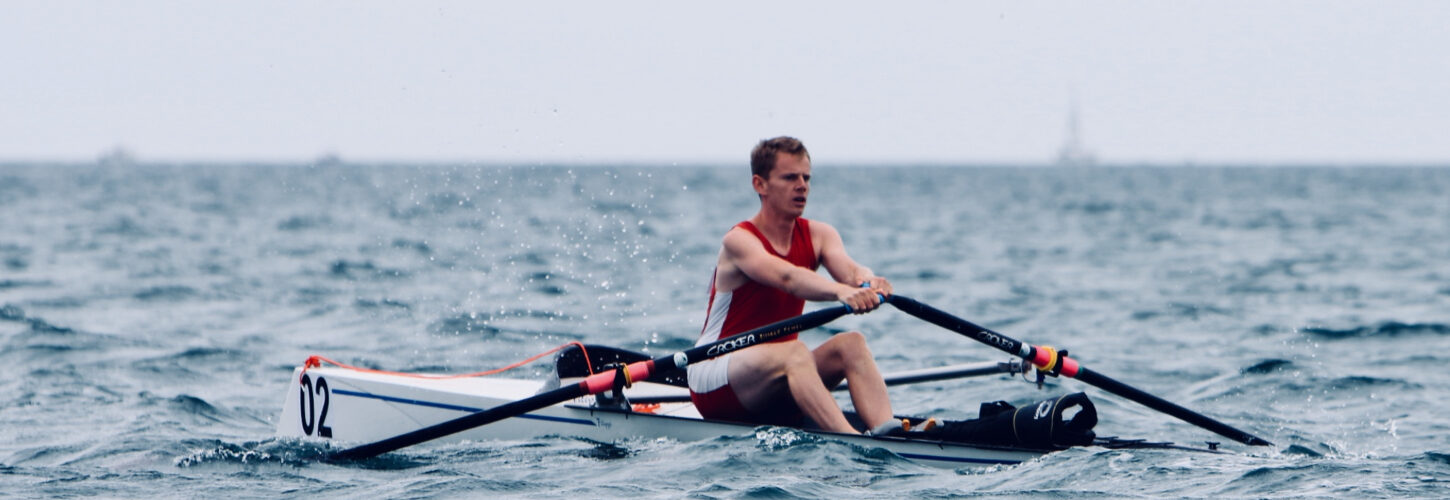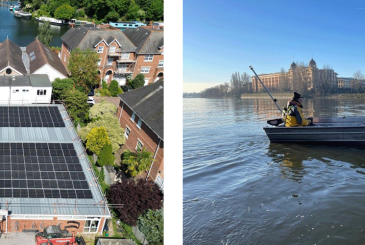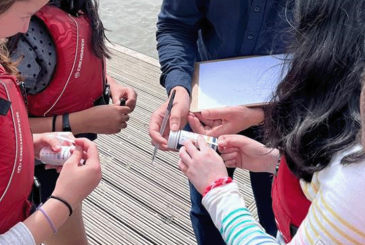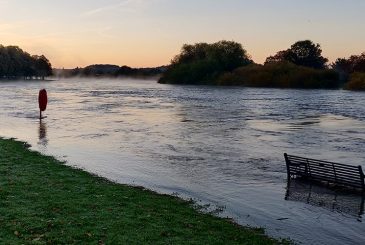It’s a year since the UK went into lockdown for the first time. Graham Hurley shares the story of his rowing community on the scenic South Devon coast
The first British victim of COVID-19 died in hospital on 5th March last year. That day Will Loftus (pictured above) was piloting a Flybe Dash 8-400 back to Exeter Airport. He landed to the news that the airline had gone bust. Within 24 hours, Will – and hundreds of other Flybe staff – were at the Job Centre. “The really bad stuff comes out of the blue,” he says now. “Until it happens, you’ve no idea how quickly everything can change.”
Until it happens.
Will, like his Flybe colleague engineer Charlie Angell, belongs to Exmouth Rowing Club (ERC). In March, the membership were fine-tuning their preparations for the coming season of coastal league races. Then, barely two weeks after the collapse of Flybe, came an unprecedented announcement from Downing Street. COVID had taken another 55 victims. The phrase on the prime ministerial lips? Lockdown.
At exactly the wrong time of the year, Exmouth Rowing Club went into hibernation: hulls chocked, gates locked, the boathouse in darkness
No one, least of all 69 rowers on the edge of Devon’s Exe estuary, suspected what was to come. “It’s flu with knobs on”, emailed club treasurer Dave McDermott. “For a week, it’ll floor you. After that, you get better.” For milder cases, that turned out to be true, but already the nation’s real job was to protect the NHS. Ex-ERC sculler Laura Childs was a respiratory nurse at Devon’s major hospital, and already it was evident that staff would be under growing pressure. “Nursing COVID wasn’t ever simple,” she says. “It tests you and the system in every way.”
And so, at exactly the wrong time of the year, Exmouth Rowing Club went into hibernation: hulls chocked, gates locked, the boathouse in darkness.
Out in the fresh air, when you took your permitted exercise, the town was transformed: the clear blue sky no longer latticed with contrails, the seafront no longer a playground for boy racers, nothing but birdsong and the peaceable stir of the rising tide.
Both Pete Bradshaw and Bob Board are senior rowers, used to a decade of twice-weekly outings. “Seeing the estuary at high water, flat as a pancake, no wind, was the worst possible news,” says Bob. “We should have been out there. Conditions were perfect.” Pete agrees. “It was like going into the void. Where would all this end?”
On club social media, the tone was jokey, the challenge novel, but for Anna Childs (Laura’s sister) there was already a darker side. “Lockdown isn’t very funny if you’re living alone,” she says. “We needed to find some way of replacing the club until everything came good again.”
The answer was The Lovelies, half a dozen like-minded ERC female rowers who swapped phone numbers, created a WhatsApp group, mustered a glass or two of wine on Friday nights, and explored the miracle of Zoom. For Anna, who’d recently started a new business as a gardener, this was a near-perfect solution to the club’s social excitements. “On club nights, we’d often put in the effort and then have a post-session cider at the Ocean. I really missed that. But then I realised that we Lovelies had each other.”

They began to stay in touch on a near-daily basis. Any Lovely who dropped off the radar got a precautionary call. Are you okay? Is there anything you need? Anything any of us can do? Then, one morning, came a WhatsApp from Laura. She had a crisis. Her young son, Owen, had shed a tooth. Laura had looked high and low for a coin to slip under his pillow but under lockdown rules, shops were only accepting plastic. Within the hour, a pound coin turned up at her front door. The virus outwitted by the tooth fairy? Brilliant!
April came and went. By now, a rota of club members were checking the premises every evening, posting brief reports on their cell phones. These updates quickly developed a life of their own, much-viewed nightly entertainment complete with limericks, wind-ups, and shadowy figures in black balaclavas.
Management of the club continued with committee meetings conducted on Zoom (a relief for some because it concentrated minds), while veteran sculler Peter Todd, once Chairman of the Sheffield Rowing Club, drew up a consolatory list of what he wasn’t missing. They included getting up in the dark for an early row and the long one-hour pulls upstream against a four-metre tide when nothing you’re looking at ever seems to move. “But that was nothing,” he says ruefully, “measured against those great days when the sun comes out, and the seals are talking to you, and you’ve lost count of the sheer numbers of birds you’ve just seen, and that great moment when you finally make a landing upriver and broach the coffee and the stickies and put the world to rights.”
Late May, to general relief, brought a partial relaxing of lockdown rules, and the management committee figured out ways to thread regular outings through the advice coming from British Rowing. Dave McDermott knew the COVID guidance documents were important, not least because the club’s insurance demanded total lockstep with the sport’s governing body. No compliance, no insurance. No insurance, no rowing.
“That can be daunting but we were probably the only coastal rowing club to look for innovative ways of staying on the water within the rules. In quad rowing, with our 33-foot Saffrons, we maintained the two-metre rule by going to sea with cox, three, and bow. Later, to avoid the cox-stroke face-to-face interaction, we rowed three, two, and bow. A couple in our own boat were married, so as long as they were cox and stroke, we bubbled along with a full crew.”
Tricky stuff? Lots of work with the tape measure? Yes. But it put ERC back on the water.
Thinking outside the COVID box paid off throughout the summer. Crews resumed a near-normal schedule, despite the absence of coastal league races, and fitness levels soared with the extra effort demanded by depleted crews. Club captain Joey Stafford designed exercise regimes to survive the Rule of Six.
“We’d have one group upstairs working on technique, while the other group were down with me doing the hard-core circuits. No way was COVID going to beat us.”
Club chairman Tony Crowhurst was also beginning to worry about the club’s financial health, but then news arrived of a one-off, non-repayable £10,000 grant from East Devon District Council, which neatly covered all the rebated membership fees, and lost sponsorship opportunities.
After a summer of social distancing and sanitising protocols, came the second period of lockdown. By now, pilot Will Loftus was driving a delivery van for Argos, aircraft engineer Charlie Angell – after a tussle with COVID – was working at a local holiday park, and the Lovelies were getting to know each other even better.
One of them was Anne Jordan. After the death of her long-term partner, she’d been living alone. She worked from home as a corporate investigator and maintained a fine allotment. The brief return to rowing reminded her of all the benefits of getting afloat.
“Rowing is the way my over-active brain zones out. You’ve had a bit of a day. You get in a boat. You rock forward and backward to a rhythm. You listen to the clunking gates and the slide, you hear the waves lapping, you focus on your technique, and all your accumulated stress and worries fall away. That’s how I coped before lockdown.”
In the summer we were afloat again, and the old magic worked, but suddenly the club closed down for a second time. Then what?’
The challenge fell to Jon Houghton, a club member with racing in his bones. Married to the lovely Sheila, they’d journeyed far and wide as a couple, and he felt the need for a serious ERC expedition. By now it was October. Dave McDermott had arranged for the loan of the club’s 12 Concept2 ergos on a rotational basis, and on WhatsApp Jon shared his determination to launch the following week and head for La Gomera in the Canaries.

The bid was to make the 4,800 kilometre transit by Christmas. After that, provided not too many people had died en route, it was onwards across the Atlantic to Rio de Janeiro, another 7,000 kilometres. To give the ERC greyhounds a hare to chase down, he introduced an emphatically non-virtual rower in the shape of Zirk Botha, a 59-year-old South African who was setting out from Cape Town with the same destination in mind. The ERC bid? To arrive in Rio in time to welcome Zirk across his personal finishing line.
The La Gomera WhatsApp group, 25 strong, set to. Jon, as tour guide, script executive and navigation meister, plotted a route across the Channel from the number 10 buoy off ERC’s launch beach to the Breton Coast. From there, his WhatsApp Ergoistes would route west, pulling kilometre after kilometre, tracking from headland to headland in the face of dodgy tides and stiffening winds.
From time to time, as a reward, Jon would organise runs ashore. A particular fish restaurant in Douarnanez. A wild evening with a Celtic rock group in Concarneau. A remote tapas bar at O Barqueiro on Spain’s Galician coast. By Christmas Eve, exhausted, ERC’s finest limped into La Gomera, in the Canaries. Here, they would refuel before tackling the next stage, the gruelling transit to Brazil.
One of the older rowers is Les Norcliffe. Once a Royal Marine, then a CID detective, Les has become a club legend. He organises social rows throughout the year, spicing long 18km outings with the promise of a pub at half time, and Jonno’s La Gomera wheeze caught his eye at once.

Les has an ergo of his own, and he began to contribute serious distance on a near-daily basis. In November, fed up with the chilly gloom of his garage, he negotiated a slot alongside his wife’s ironing board in the spare bedroom, and there he stayed throughout the winter, heading steadily south, eager for the next run ashore. “As long as you’ve got something to fill the inside of your head,” he says, “the kilometres fly by. My favourite watch is a series called Bangers and Cash. After the first 6km, I have a swill of water and stretch my arse but then I’m back to it. So far, I’ve lost more than a stone.”
Sue Pope, one of the Lovelies, is also en route to Rio. Working from home as a legal services assistant, she’s finding that the La Gomera effort adds extra structure to her day. “I tend to ergo on what used to be club nights – Tuesdays and Thursdays – and again on Sundays. Half past five in the evening finds me in the spare bedroom, hauling away, trying to remember everything I’ve been taught. My best ever distance? 10.6km.”
After a riotous Christmas on the beach at La Gomera, ERC are now pushing hard for South America, with ex-policeman Adrian Russell planning an early celebration for his millionth metre. A Land Group contribute distance from jogging expeditions, and outings on the bike, while a recent Super Sunday effort saw 25 rowers bring Rio 250 kilometres closer, but the daily updates from Zirk Botha’s support team are daunting.
“This guy really knows what he’s doing,” says tour guide Jon Houghton. “He turned left off the African coast at exactly the right spot to catch the trade winds and the trans-Atlantic current, and he’s now pulling two and a half knots, which is nearly walking speed. The plan was to welcome him on the beach in Rio. At this rate, he’ll be dying of boredom waiting for us.”
But the Ergoistes are still up for the challenge. One of them is Caroline Robson who, in Les’s phrase, “has been really blasting it”. She rowed sweep for University College, London and ERC is her first taste of coastal rowing. She’s fallen in love with the vivid oranges and pinks of an Exe sunset, and is on first name terms with the seal who pops up beside the boat on evening outings. She also misses the collective beasting sessions on club nights, torrents of lactic acid scored to AC-DC, but has nothing but admiration for the club’s response to the paralysing embrace of COVID. “It’s taught me a great deal,” she says. “Like not putting hand sanitiser on fresh blisters.”
For those left behind, an ERC Christmas under Covid threw down yet another gauntlet. 2019’s celebration brought three long tables of carousing members to the clubhouse, but this year was always going to be very different.

The Rule of Six was no friend of mass quaffing, but Suzanne Isaacs, the Mistress of Revels, came up with ERC’s answer: a pop-up shelter in front of the boathouse, limitless supplies of mince pies and mulled wine, and a carefully worked-out schedule that gave every group a chance to raise a glass to better times. Members posed for photos, and the patchwork of faces peering out through the specially constructed cartoon frame will one day become one of the club’s many memories of laughter in a time of plague.
The New Year brought the third and longest dose of lockdown. Vice-chair Steve Hughes, an emeritus professor at Exeter University, mulled over the delicate balance between ERC doing its physical thing afloat while the rest of the world looked on, and decided to keep the club flag flying throughout the crisis as a symbolic gesture in the face of Downing Street chaos.

Group sweating, he also decided, was – on balance – a risk worth taking. Retired teacher Richard Robinson, like Steve, sought solace in an earlier wisdom: Nil desperandum, he wrote to me, per ardua ad marem! Sod the virus, and reach for the stars (a loose translation, Richard).
Ex-captain Morag Van Niekerk, meanwhile, had drawn her own bead on the virus. Morag was still cycling to to her office in Exeter every day and paid exactly the same attention to the weather forecast as she always had afloat.

Twenty-two miles a day was keeping her fit, but the master stroke for her and her partner Rob was the purchase of a second-hand Channel Isles quad which they’ve christened Jurassica, a doff of the cap to our magnificent Jurassic Coast. Jurassica is an easy carry for four rowers and will offer the key to a business they plan to start, Jurassic Coast Rowing. Morag is also the club’s major link to this year’s British Rowing Offshore Championships, due to be staged in July at – guess where – Exmouth.
“I’m only really at peace when I’m in a boat, especially these days”
Mid-February brings better news. As I write this piece, the early morning queue for vaccination at the town’s tennis centre is already forming, and the Beast from the East has stumbled back to Siberia. Will Loftus, the pilot grounded by the collapse of Flybe, recently returned from Vienna where he bought time on a flight simulator to keep his licence current, a trip that simply confirmed that no corner of the known world has escaped the grip of the virus. Just now he’s working for a local firm surveying fibre link installations. Days can be glum, he says, but an hour in his works van listening to other people’s woes on BBC Radio Four tells him that life could be a whole lot worse.

“This period of lockdown has been a real test,” he adds, “but out on the water has always been my happy place, and rowing during the summer filled the hole in my life that Flybe left. It gives me a reason to get up in the morning, a reason to get out of the house. Miles offshore on a still summer’s morning, or a blissful evening on the Exe estuary, and everything’s back in perspective.
“I’m only really at peace when I’m in a boat, especially these days. Splish, splosh, splish, splosh for two hours? That, for me, is sanity.”
Thanks to Graham and Tom Hurley and members for Exmouth RC for the images










